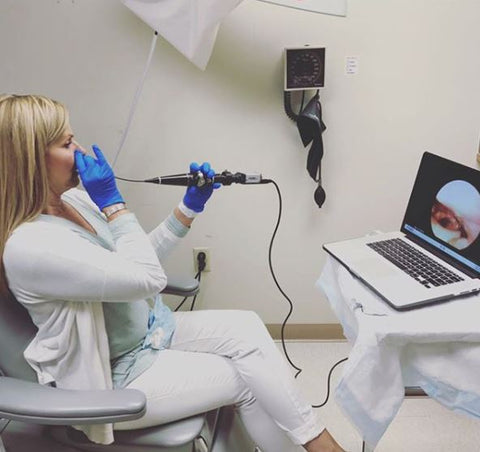BLOG


Dysphagia: Who. What. Why.
WHO. WHAT. WHY.
WHEN YOU DON’T KNOW, WHAT YOU DON’T KNOW
by Colette Ellis, M.Ed., CCC-SLP, BCS-S
WHO NEEDS A DYSPHAGIA EDUCATION COURSE?
- Clinicians who evaluate and treat dysphagia, regardless of location
- Physicians, phoniatrists, physician assistants, nursing staff interested in a patient-centered team approach
- Parents, educators wanting knowledge and skill for care planning and follow-through


WHAT IS THE DYSPHAGIA COURSE ABOUT?
- Basic head and neck anatomy and physiology with regard to feeding and swallowing
- Performance skills needed for clinical dysphagia and cranial nerve evaluations
- Identification and basic interruption skills needed during an instrumental examination (MBSS or FEES)
- Treatment instruction for improved patient and client outcomes
- Problem solving strategies for difficult cases
WHY TAKE A DYSPHAGIA EDUCATION COURSE?
- Dysphagia is a dynamic field of study within our field of study, and is constantly changing
- Dysphagia education at the graduate level may leave clinicians feeling inadequate to step into a medical setting without additional training
- Dysphagia can lead to life-threatening consequences and therapists need to stay abreast with the latest evaluative measures and treatment techniques
- There is never a cookie-cutter approach when evaluating and treating dysphagia, no single technique, exercise or maneuver will ensure success. All clinicians need to equip themselves with evidence based measures along with the patient’s wishes and goals to ensure improved nutrition, safety, satisfaction and quality of life
UPCOMING WORKSHOPS: “PEDIATRIC AND ADULT DYSPHAGIA: WHAT’S YOUR SWALLOWOLOGY?” (1.2 ASHA/AOTA CEUS)




PEDIATRIC DYSPHAGIA LIVE WEBINAR
Colette Ellis, M.Ed., CCC-SLP, BCS-S is hosting a live webinar (0.2 ASHA CEUs) on Pediatric Dysphagia this Monday, July 30.
This webinar will focus on how swallowing disorders impact feeding in pediatric and adolescent clients. Instruction will include causes of swallowing disorders, swallowing test and assessment, and tools and techniques to facilitate successful feeding.
The live broadcast of the Pediatric Dysphagia Webinar will be on Monday, July 30 at 12-2 p.m. EASTERN TIME.
Can’t make it the live broadcast? The recorded version will be provided to learners who purchase a seat for this webinar seat approximately 3-5 days after webinar date. You can also purchase the recorded version after the live air date.
WHAT IS FEES?
Do you know what the Fiberoptic Endoscopic Examination of Swallowing is all about? The flexible fiberoptic endoscopic examination of swallowing (FEES) is a procedure designed to assess swallowing function through the use of vocal tract visualization and imaging to examine the pharyngeal and laryngeal structures. In FEES, a flexible fiberoptic endoscope is introduced transnasally to the patient’s hypopharynx where the clinician can clearly view laryngeal and pharyngeal structures. The patient is then led through various tasks to evaluate the sensory and motor status of the pharyngeal and laryngeal mechanism. Food and liquid boluses are then given to the patient so that the integrity of the pharyngeal swallow can be determined.
DYSPHAGIA EXPERT: COLETTE ELLIS
 Colette Ellis, M.Ed., CCC-SLP, BCS-S is a speech-language pathologist with over 38 years of clinical experience, holding Board Certification in Swallowing and Swallowing Disorders, and is a member of the TalkTools® speakers bureau. She is the owner of 29th Street Therapy Center, and the lead clinician for Grady Memorial Hospital, both in Chickasha, Oklahoma. She has recently launched a mobile FEES (fiberoptic endoscopic evaluation of swallowing) service to better serve patients and families who may not have access to specialized swallowing and voice diagnostics, (Advanced Diagnostics: Swallowing & Voice Specialists).
Colette Ellis, M.Ed., CCC-SLP, BCS-S is a speech-language pathologist with over 38 years of clinical experience, holding Board Certification in Swallowing and Swallowing Disorders, and is a member of the TalkTools® speakers bureau. She is the owner of 29th Street Therapy Center, and the lead clinician for Grady Memorial Hospital, both in Chickasha, Oklahoma. She has recently launched a mobile FEES (fiberoptic endoscopic evaluation of swallowing) service to better serve patients and families who may not have access to specialized swallowing and voice diagnostics, (Advanced Diagnostics: Swallowing & Voice Specialists).
Colette received her Bachelors of Science and Masters of Education in Speech-Language Pathology from the University of Central Oklahoma. Colette specializes in the evaluation and treatment of feeding, swallowing, voice, neurogenic, cognitive and oral placement disorders (OPT) of all ages. Her areas of expertise include dysphagia, voice disorders, TBI (traumatic brain injury), and OPT. Colette has specialized training in speech/oral sensory-motor/feeding therapy, aphasia, apraxia, aqua therapy, Beckman techniques, MBSImP, video-stroboscopy, and fiberoptic endoscopic evaluation of swallowing (FEES). She is fluent in French, and has been invited to speak at numerous conferences and seminars across the United States and internationally. She teaches classes on sensory-motor feeding and swallowing disorders for ASHA and AOTA CEUs.


